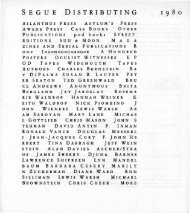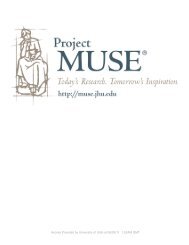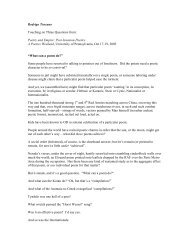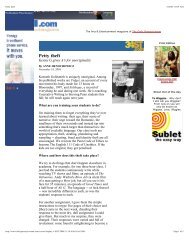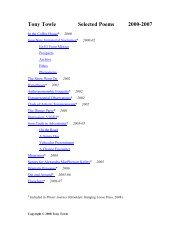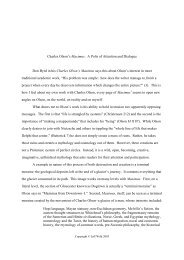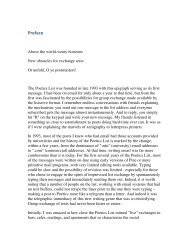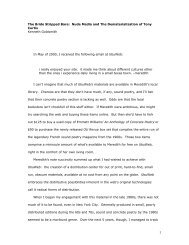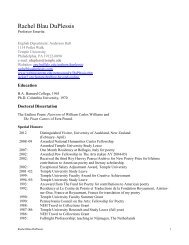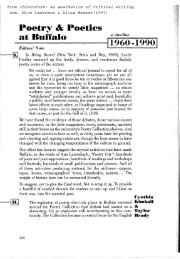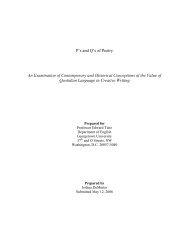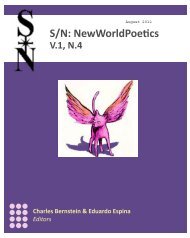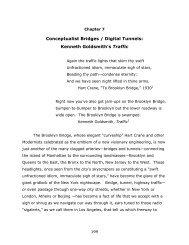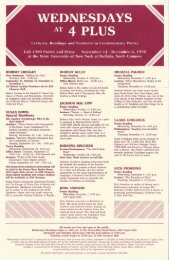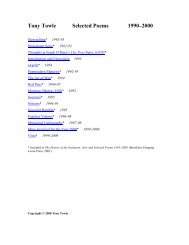'EASTER, 1916': YEATS'S FIRST WORLD WAR POEM
'EASTER, 1916': YEATS'S FIRST WORLD WAR POEM
'EASTER, 1916': YEATS'S FIRST WORLD WAR POEM
You also want an ePaper? Increase the reach of your titles
YUMPU automatically turns print PDFs into web optimized ePapers that Google loves.
FN:12<br />
FN:13<br />
230 marjorie perloff<br />
Tim Kendall chap12.tex V1 - October 4, 2006 1:50 P.M. Page 230<br />
Arthur Griffith, the leader of Sinn Féin. Accordingly, his initial stance was one of<br />
caution: ‘There is nothing to be done but to do one’s work and write letters.’ 12 And<br />
he remained in his London flat, detached from the turmoil.<br />
But by May, reports came in of the murder, by the British police, of the<br />
pacifist Francis Sheehy Skeffington, a popular Dublin figure, well known to Yeats.<br />
Furthermore, the wholesale execution of the rebels aroused the sympathy of Lady<br />
Gregory as well as the entire Yeats family. Those hitherto regarded with bemusement<br />
and some contempt joined the visionary company of the great nineteenth-century<br />
Irish patriots Robert Emmet and Wolfe Tone. Yeats now became sharply critical of<br />
the English government. In an important letter to Lady Gregory, he wrote:<br />
If the English conservative party had made a declaration that they did not intend to rescind<br />
the Home Rule Bill there would have been no rebellion. I had no idea that any public event<br />
could so deeply move me—and I am very despondent about the future. At this moment I<br />
feel that all the work of years has been overturned, all the bringing together of classes, all<br />
the freeing of Irish literature & criticism from politics . . . . I do not yet know what [Maud<br />
Gonne] feels about her husband’s death. Her letter was written before she heard of it. Her<br />
main thought seems to be ‘tragic dignity has returned to Ireland’. She had been told by two<br />
members of he Irish Party that ‘Home Rule was betrayed’. She thinks now that the sacrifice<br />
has made it safe. 13<br />
And he adds, ‘I am trying to write a poem on the men executed—‘‘terrible beauty<br />
has been born’’.’<br />
It is interesting to observe how contradictory even this letter is. When Yeats<br />
notes that ‘all the work of years has been overturned’, he is not referring to the<br />
drive for Irish freedom but, on the contrary, to his old Gaelic League effort to<br />
‘free’ Irish literature from all politics—an effort already made futile by the events<br />
themselves. As for the ‘bringing together of classes’, one senses that Yeats is more<br />
eager to find himself at one with the class above him, the aristocracy, than to<br />
befriend the members of the working class. And as for Maud Gonne’s aphorism<br />
on tragic dignity, it is not at all clear that Yeats agrees with it. But he could not<br />
bring himself to cross her. Indeed, after a brief visit to Dublin in early June, Yeats<br />
decided to spend the summer in Normandy, where Maud Gonne was living with<br />
her children, with the stated intention of proposing marriage to her once again.<br />
When Gonne—predictably—refused, he turned to her daughter Iseult, proposing<br />
to her as well, and again being refused. The neurotic relationship with both women<br />
dragged on until, at the end of August, Lady Gregory summoned Yeats back to<br />
Ireland and took him straight to Coole Park for a much-needed rest. It was at Coole<br />
on 25 September that Yeats finished ‘Easter, 1916’.<br />
I detail this material, much of it familiar to Yeats students, so as to help the<br />
reader understand that a political poem like ‘Easter, 1916’—or, for that matter,<br />
12 Yeats to Lolly Yeats, n.d., quoted in Foster, W. B. Yeats, ii. 46.<br />
13 Yeats to Lady Gregory, 11 May 1916, in The Letters of W. B. Yeats, ed. Allen Wade (London:<br />
Rupert Hart-Davis, 1954), 612–13; my italics.



